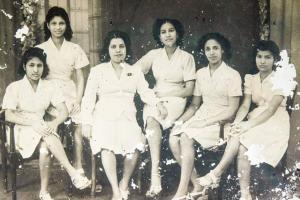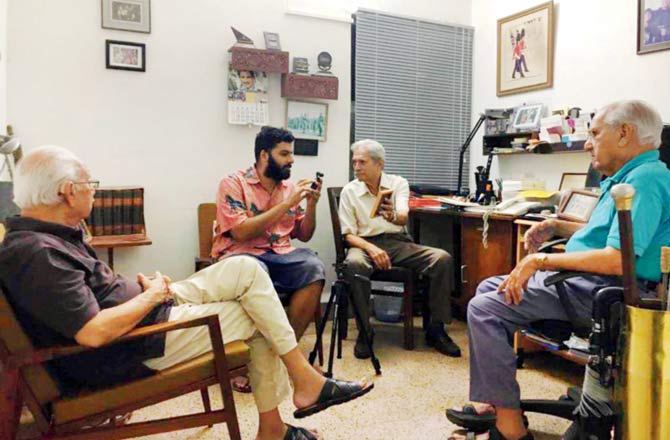An evolving archival project to be showcased at Serendipty Arts Festival this month, is attempting to retrace local histories through photographs and family heirloom

Fernandes family: Antoinette's sisters moved to Bombay in the 1940s to work at her aunt's beauty salon Primo's in Byculla
Memories are a rare treasure. But like old photographs, curling at the edges, they alter. The details thin with passing time, making this story unfinished. In August this year, when Lina Vincent and photographer Akshay Mahajan started work on Goa Familia, an evolving archive exploring the multidimensional aspects of family histories in Goa, they knew that dredging up distant memories wouldn't necessarily result in the absolute.
ADVERTISEMENT
"The act of remembering is not always perfect," Mahajan admits. "One of those we interviewed, Antoinette Fernandes, suffers from dementia. Her memories came in bursts, when she saw old photographs or was prompted by her son Marius Fernandes. In some cases, photographs triggered almost perfect recollection, in others, the people at the edges grew fuzzy in her mind." Yet, stories like those narrated by Antoinette are the only possible way to preserve what remains of her life.

Antoinette Fernandes's grandmother, Ana Joaquina D’Costa Rodrigues, single-handedly built a new home with stones from a nearby quarry, after the family moved from Divar to Salvador do Mundo following a disease outbreak. Pics Courtesy/Goa Gamilia, Srendipity Arts Festival
Funded by the Serendipity Foundation in association with Rahaab Allana, curator of the Alkazi Foundation For The Arts, the project that celebrates local Goan histories, involves documenting still-imagery, ancestral heirlooms and other assorted memorabilia along with oral narratives.
The first milestone for the project will be "a work in progress" exhibition at the annual Serendipity Arts Festival, scheduled this year between December 15 and 22. "Goans have a strong sense of personal and local history. Sitting on the balcão and regaling visitors with rich anecdotes from the past or just sharing village gossip is a common pastime in Goa," says Mahajan.

Bharne Family: An undated photograph of a float by the Bharnes at the Panjim carnival. The family has been dealing in fabric and readymade clothes for 115 years
The team usually organises a minimum of two visits of around two to three hours each. "It is sometimes necessary to involve other members of the family, in order to prompt memories or for translation. Our process is organic. There are no fixed questions or framework—each person or family is free to recall and share what they feel, and talk about images that spontaneously evoke reactions," says project head Vincent.
The responses received have been varied. Some touch on memory, others are personal, but in many cases, they have also received deeper stories of Goan history, and migration. The duo came across the fascinating story of the Bharne clan, which owed its existence to one women. The family that lived in Madkai, perished during the second plague in Old Goa in the 18th century. "Except for one daughter-in-law of the house who was in Sanvordem to deliver her child. The happy coincidences of existence," says Mahajan.

Akshya Mahajan (second from left), creative collaborator with Goa Familia, during a session with the family
Antoinette shares how her family, living on Divar Island, had to move to Salvador do Mundo, on the mainland, because of a disease that broke out in 1920. "Her grandmother, Ana Joaquina D'Costa Rodrigues, purchased a piece of land for R200. It was available because it was too close to a cemetery," says Vincent. She single-handedly took charge of building the home, with stones from a nearby quarry. "Her photograph shows her in heavy jewellery and traditional costume—a strong woman with a determined stance. Stories such as these come alive with images as visual references to people and places," Vincent adds.
It's interesting how the very act of archiving can also sometimes bring with it amusing patterns, that are hard to ignore. "We found that there is usually one memory keeper [in the family], who stores all the photographs and memorabilia. This was almost always a woman. We also met people who didn't like looking at old photographs and preferred to live in the moment," he says. The team is only slowly warming up to the many challenges that come with a project of this nature. "It requires immense patience and willingness to have long conversations that could be about any number of subjects," says Vincent.
"I am conscious about being open to every kind of memory and attempt to avoid being judgemental or biased. In the end, it's not about fact or fiction, real or staged recollections. It's also about the narratives that people treat as their own. Sometimes, a conversation leads up positively and then suddenly stops as the family changes their mind. We are ready for that too." If there is any reluctance to share information, it is sometimes due to the inherent doubt about the manner in which images and recordings will be used. "[To counter this], we have developed a methodology that is sensitive and respectful to these concerns, making sure that the broad purposes of developing a family archive for Goa, with Goan contributions is highlighted," Vincent says.
They are now hoping that the platform expands into a powerful community project to document family histories beyond Goa too. She adds, "But, it is particularly, intriguing to document Goa because of the amount of movement of populations in and out of the region and its unique relationship with the rest of India and other Portuguese colonies."
Catch up on all the latest Mumbai news, crime news, current affairs, and also a complete guide on Mumbai from food to things to do and events across the city here. Also download the new mid-day Android and iOS apps to get latest updates
 Subscribe today by clicking the link and stay updated with the latest news!" Click here!
Subscribe today by clicking the link and stay updated with the latest news!" Click here!






